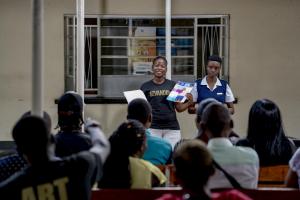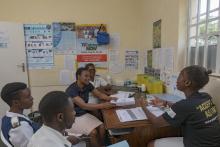The power of peers: An adolescent idea for managing HIV rises
Zvandiri is a life-changing peer-to-peer programme of Africaid that started in Zimbabwe and is helping to improve adherence to antiretroviral medication among children, adolescents and young people and thus promoting viral suppression.
The Government of Zimbabwe has replicated the programme in 51 of its 63 districts and integrated the services into its national health system.
Zvandiri, which means “as I am” in Shona, started as a support group for six HIV-positive adolescents in Harare in 2004 to develop skills for growing up with HIV. Today, around 1200 trained, mentored adolescents and young people living with HIV, known as community adolescent treatment supporters, or CATS, primarily provide the services, which include HIV testing, antiretroviral therapy initiation and adherence monitoring. In addition, the CATS provide support for sexual and reproductive health, mental health, disability, social protection and young mother services. They advocate at the community, national and international levels and speak up for the needs of HIV-positive children, adolescents and young people.
The CATS are based in health facilities and supervised by a nurse and counsellor; they work side by side with regular and mental health nurses. They meet with young people in the clinics and make home visits; and they manage support groups and mobile health platforms. They provide information, counselling and any other support needed.
The differentiated services of Zvandiri, according to their website, revolve around helping all young people “know, understand accept their HIV status; that they start and remain on antiretroviral treatment with understanding and confidence; that they remain engaged in treatment, care and support services and that they feel cared for, understood, supported and valued”.
The CATS provide self-test kits to adolescents aged 16 and older; if someone tests negative, they are linked to government prevention services. Counselling and links to the national care and support system follow a positive outcome. To help their peers manage their health care, the CATS see them at home, in clinics, in support groups and through SMS platforms. Frequency of interaction is determined by a person’s needs. The CATS work with clinic staff to overcome challenges to adherence and well-being.
Young mothers living with HIV are trained and mentored as young mentor mothers who support their peers through home visits and young mother support groups. The CATS have been trained and mentored to identify peers with a disability who could be or are living with HIV also.
Six countries on the African continent have adopted or adapted the Zvandiri model and the organization works with the national ministries to boost the capacity of health workers, social welfare officers and teachers with services that are responsive to the evolving needs of children and adolescents living with HIV. This includes the development of national training curricula and the training and on-the-job mentorship of service providers. The CATS co-conduct the training.
“I am proudly living with HIV,” explains Shanine Mushonga, whose parents died of AIDS when she was young. Now in her 20s, she started as a Zvandiri beneficiary, became a CATS counsellor, then a global advocate helping other countries adapt the programme and now leads the programme in a district. “This support network really changed my life and made me understand I can do anything by helping my peers,” she says.
More than 74 000 children, adolescents and young people in Zimbabwe have been touched by a peer through Zvandiri. “We’ve seen children born in a time without treatment now growing up with a whole package of support – and it’s not about just taking medication. It’s about growing up and living with HIV,” says Nicola Willis, Director of Africaid, which she started 15 years ago.
“To see how young people have overcome the challenges in their lives and turn that around and become providers of support for others at such a scale is really phenomenal,” she adds. “And to see how policymakers, funders, service providers acknowledge that adolescents and young people have such an important role in our response to HIV has been the transformation. We’ve shown that it’s not only important but it’s effective. Young people really can do this.”
Communications and marketing officer
Tel: + 242 06 520 65 65 (WhatsApp)
Email: boakyeagyemangc [at] who.int (boakyeagyemangc[at]who[dot]int)
Communications Manager
WHO Regional Office for Africa
Email: okas [at] who.int (okas[at]who[dot]int)
Tel: +242 06 508 1009




